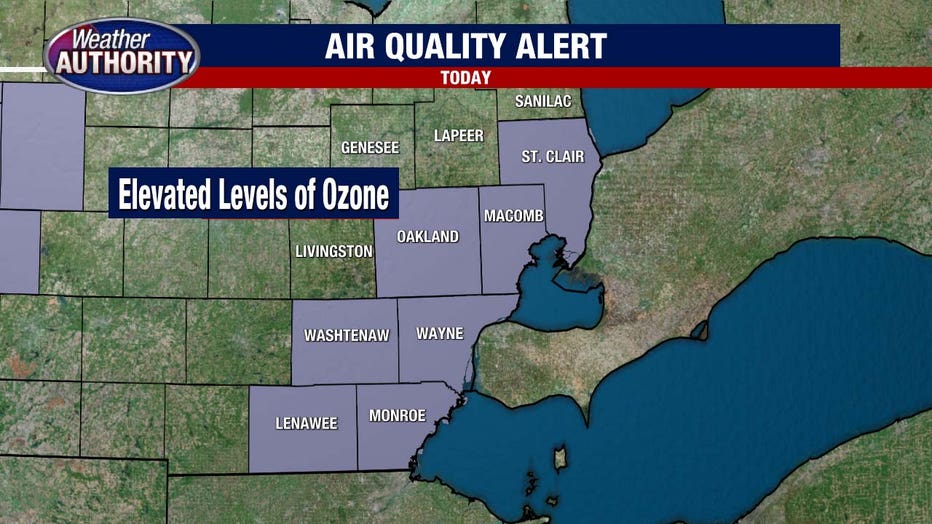Metro Detroit under Air Quality Alert due to elevated ozone levels - what it means

Temps in mid to upper 80s with Air Quality Alert
Alan Longstreet has what to expect Monday in Metro Detroit.
DETROIT (FOX 2) - Metro Detroit, along with several other areas of the state, is under an Air Quality Alert on Monday.
Though the state has had poor air quality in recent weeks over Canadian wildfire smoke, elevated ozone levels have prompted this alert.
Ground-level ozone is a pollutant that can cause breathing issues, lung and throat irritation, and other respiratory symptoms, especially if you have an existing lung condition such as asthma. There is also ozone that is considered good. That ozone is in the upper atmosphere and protects from the sun's rays. However, when it is lower in the atmosphere, it is not good.

The Environmental Protection Agency has an Air Quality Index, which rates the quality from good to hazardous. These levels tend to fluctuate throughout the day.
Monday, the air quality is expected to be unhealthy for sensitive groups. This means that people in sensitive groups may experience health effects. Others who are not in sensitive groups are less likely to experience health effects but could still be impacted.
Limiting time outdoors is recommended to reduce your risk of negative health effects.
MORE: Here's what the AQI colors mean
While the ozone Air Quality Alert is in effect, the National Weather Service advises against doing activities that could contribute to ozone pollution, such as refueling vehicles, using lighter fluid, and operating gas-powered lawn equipment.
Air quality health tips:
During unhealthy for sensitive groups (AQI orange) to unhealthy for everyone air quality events (AQI red), the Michigan Department of Health and Human Services (MDHHS) advises the following:
For people with heart or lung disease, pregnant people, older adults aged 65+, children, and teens it is suggested to take the following steps to reduce exposure:
- Avoid strenuous outdoor activities.
- Keep outdoor activities short.
- Consider moving physical activities indoors or rescheduling them.
For everyone else:
- Choose less strenuous activities (like walking instead of running) so you don’t breathe as hard. ‘
- Shorten the amount of time you are active outdoors.
- Be active outdoors when air quality is better.
During very unhealthy or hazardous for everyone air quality (purple to maroon Air Quality Index levels), MDHHS advises the following for everyone:
- Stay indoors with the doors and windows closed using MERV-13 or better air filtration.
- Seek shelter elsewhere if you do not have an air conditioner, and it is too warm to stay inside with the windows closed. Call or text 211 or contact your local health department to find out if there is a shelter or cooling center nearby.
- Use air filters to improve indoor air quality. Whether you have a central air conditioning system or a portable room unit, use high efficiency filters to capture fine particles from smoke. If you don’t have access to those filter systems, you can create a temporary air purifier with a 2012 or newer box fan and attaching a MERV-13 or higher air filter to it. Information is available online.
- Keep activity levels low.
- Avoid outdoor activities.
- Use N95 style masks if you have to be outside.Surgical and cloth masks are not recommended as they are not designed to prevent breathing in the fine particulate matter in wildfire smoke.

